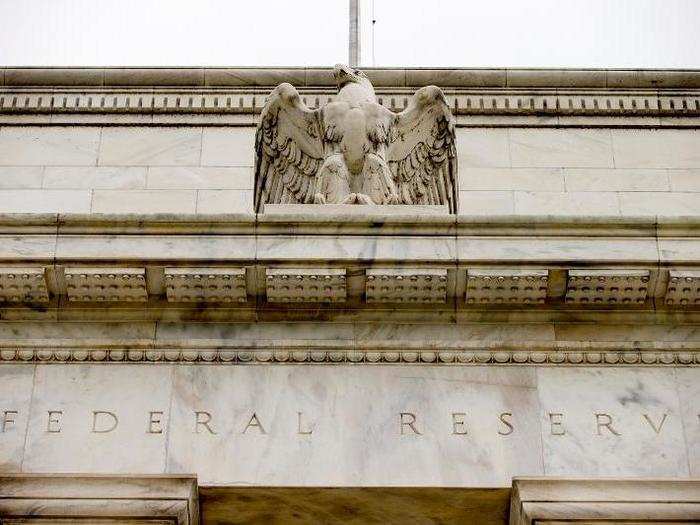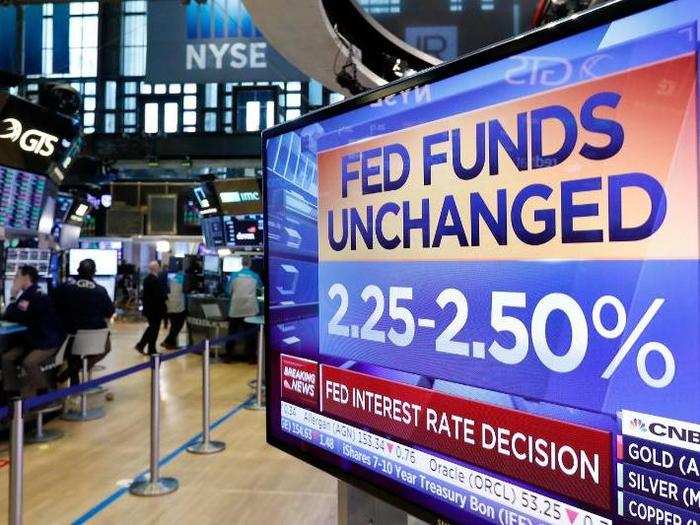- Home
- slideshows
- miscellaneous
- The Fed was 'as dovish as they could be without spooking the market.' Here's what Wall Street is saying.
The Fed was 'as dovish as they could be without spooking the market.' Here's what Wall Street is saying.
On the economic outlook

On the next rate adjustment

"We still think the Fed’s downwardly revised projections for economic growth and underlying inflation are too optimistic. With economic growth likely to remain below its 2% potential pace this year, we expect attention will soon turn to rate cuts. The markets are already pricing in one rate cut for 2020." -Michael Pearce, economist at Capital Economics
"In short, then, we think the Fed is overweighting the impact of the real, though likely temporary, slowing in manufacturing, and the chance that external forces will dampen emerging wage pressures. They might be right, but the balance of risks, we think, points to an about-turn later in the year, and rate hikes coming back onto the agenda." -Ian Shepherdson, chief economist at Pantheon Macroeconomics
"Based on these rather benign projections from the FOMC, our outlook for accelerating core inflation at the end of this year and into next year will likely catch policymakers by surprise, and should push them back into hiking mode, in our view. We expect the Fed to hike next in December." -Ellen Zentner, economist at Morgan Stanley
On inflation and employment

"Powell called low inflation 'a major challenge of our time' without offering any countering narratives. Such comments along with downbeat inflation projections paint a picture where the Fed does not feel very confident about prospects for inflation." -Ellen Zentner, economist at Morgan Stanley
"The committee maintained the view that a sustained expansion, a strong labor market, and steady inflation as the most probable outcome over the medium term … Overall, they reiterated the solid gain payrolls, but appear to maintain a more dovish tone on the economy." -Charlie Ripley, senior investment strategist at Allianz Investment Management
On the balance sheet

"We also received additional clarity on the balance sheet, and it’s even more telling that they're beginning to pull this additional lever as well, which establishes a decidedly accommodative stance for the Fed. And while economic data has slowed somewhat in recent months, most signals are telling us the US economy is in very good shape, so it will be interesting to see how inflation reacts in the coming months." -Mike Loewengart, vice president of investment strategy at Etrade
"To achieve either objective the Fed's assets purchases will have to be weighted towards shorter maturities for a time because currently the average duration of the Fed's assets is considerably greater than that of the overall Treasury market. We expect the Fed to start purchasing Treasury bills in October, but it is still unclear how large those purchases will be." -Lewis Alexander, economist at HSBC
On investment implications

"The sharp drop in Treasury yields following the decision suggests investors were surprised by the dovish tone of the accompanying statement and economic projections." -Michael Pearce, economist at Capital Economics
"Beyond the knee-jerk market reaction, however, today’s messaging from the Fed really only brings its projections into line with its policy pivot to neutrality delivered in January. The market focus will likely move to how other central banks are also responding to a slowing growth environment. With US yields still comfortably the highest within G10, the USD appears well placed to capitalize on likely policy inaction across the bulk of G10." -Daragh Maher, head of FX strategy at HSBC
"Interest rates are likely to stay low and in a range, which is good for carry oriented strategies and risky assets. An extension of the economic cycle, along with lower interest rates makes it easier for corporations to delever. As a result, credit default risks should fall, thus supportive of credit products. However, if the Fed’s policy is successful, then there is a limit to how low longer term yields will fall." -Jim Caron, managing director of global fixed income at Morgan Stanley
Popular Right Now
Popular Keywords
Advertisement
